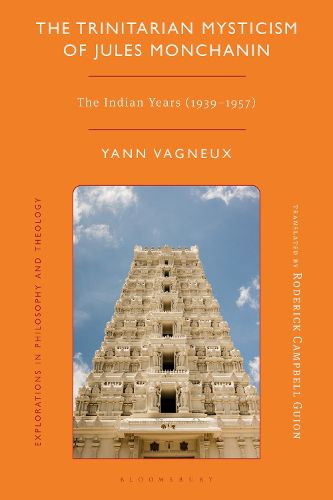Readings Newsletter
Become a Readings Member to make your shopping experience even easier.
Sign in or sign up for free!
You’re not far away from qualifying for FREE standard shipping within Australia
You’ve qualified for FREE standard shipping within Australia
The cart is loading…






The authoritative account of the pioneering philosophical encounter between Christian and Hindu mysticism in the work of Jules Monchanin, a luminary of early 20th century religious thought in France whose missionary work in India led to the formulation of a novel religious philosophy.
Before leaving for India in 1939, Jules Monchanin (1895-1957) was one of the beacons of the theological, philosophical and missiological renewal that filled the French city of Lyon during the 1930s. His thinking developed further in dialogue with Hindu mysticism. For the first time, this book examines the philosophical basis of the interreligious encounter that spurred Monchanin's system of thought.
Now available in an English edition, Yann Vagneux's text undertakes a thorough synthesis of Monchanin's thought based on his unpublished notebooks and letters, and at the same time raises theological questions and conundrums that few thinkers involved in Hindu-Christian studies dare to tackle. This volume shows how, during his time in India from 1939-1952, Monchanin's development of a Trinitarian Ontology and his study of Hindu mysticism were mutually illuminating, driven by problems of the One and the Many in both traditions. It follows on from the companion volume, The Trinitarian Philosophy Of Jules Monchanin, which explores Monchanin's contribution to the intensity of intellectual life in Lyon in the 1930's and sets out his foundation of a Trinitarian Ontology.
The book will be a key text for scholars studying comparative philosophy of religion, including scholarly material in several appendices: a chronology of Monchanin's writings; a bibliography of works by and about Monchanin, published and unpublished; a reconstruction of his thinking on time, which he elaborated in letters and fragmentary notes but was unable to complete before his death.
$9.00 standard shipping within Australia
FREE standard shipping within Australia for orders over $100.00
Express & International shipping calculated at checkout
The authoritative account of the pioneering philosophical encounter between Christian and Hindu mysticism in the work of Jules Monchanin, a luminary of early 20th century religious thought in France whose missionary work in India led to the formulation of a novel religious philosophy.
Before leaving for India in 1939, Jules Monchanin (1895-1957) was one of the beacons of the theological, philosophical and missiological renewal that filled the French city of Lyon during the 1930s. His thinking developed further in dialogue with Hindu mysticism. For the first time, this book examines the philosophical basis of the interreligious encounter that spurred Monchanin's system of thought.
Now available in an English edition, Yann Vagneux's text undertakes a thorough synthesis of Monchanin's thought based on his unpublished notebooks and letters, and at the same time raises theological questions and conundrums that few thinkers involved in Hindu-Christian studies dare to tackle. This volume shows how, during his time in India from 1939-1952, Monchanin's development of a Trinitarian Ontology and his study of Hindu mysticism were mutually illuminating, driven by problems of the One and the Many in both traditions. It follows on from the companion volume, The Trinitarian Philosophy Of Jules Monchanin, which explores Monchanin's contribution to the intensity of intellectual life in Lyon in the 1930's and sets out his foundation of a Trinitarian Ontology.
The book will be a key text for scholars studying comparative philosophy of religion, including scholarly material in several appendices: a chronology of Monchanin's writings; a bibliography of works by and about Monchanin, published and unpublished; a reconstruction of his thinking on time, which he elaborated in letters and fragmentary notes but was unable to complete before his death.